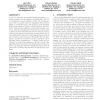Free Online Productivity Tools
i2Speak
i2Symbol
i2OCR
iTex2Img
iWeb2Print
iWeb2Shot
i2Type
iPdf2Split
iPdf2Merge
i2Bopomofo
i2Arabic
i2Style
i2Image
i2PDF
iLatex2Rtf
Sci2ools
97
Voted
KDD
2004
ACM
2004
ACM
Predicting prostate cancer recurrence via maximizing the concordance index
In order to effectively use machine learning algorithms, e.g., neural networks, for the analysis of survival data, the correct treatment of censored data is crucial. The concordance index (CI) is a typical metric for quantifying the predictive ability of a survival model. We propose a new algorithm that directly uses the CI as the objective function to train a model, which predicts whether an event will eventually occur or not. Directly optimizing the CI allows the model to make complete use of the information from both censored and noncensored observations. In particular, we approximate the CI via a differentiable function so that gradient-based methods can be used to train the model. We applied the new algorithm to predict the eventual recurrence of prostate cancer following radical prostatectomy. Compared with the traditional Cox proportional hazards model and several other algorithms based on neural networks and support vector machines, our algorithm achieves a significant improve...
Algorithms Keywords Survival | Data Mining | KDD 2004 | Neural Networks | Proportional Hazards Model |
| Added | 30 Nov 2009 |
| Updated | 30 Nov 2009 |
| Type | Conference |
| Year | 2004 |
| Where | KDD |
| Authors | Lian Yan, David Verbel, Olivier Saidi |
Comments (0)

